HeadlinesJanuary 28, 2011
Egyptian Protests Escalate Amidst Gov’t Crackdown
Tens of thousands of people are gathering in Egypt today in what is expected to be the biggest display of opposition to President Hosni Mubarak so far. The protests come amid a vast security clampdown. Police are firing tear gas into the crowds and have begun to round people up on the streets. A number of journalists have also reportedly been arrested, including some who have been badly beaten. There are also reports that Mohamed ElBaradei, the Nobel Peace laureate and former head of the U.N. International Atomic Energy Agency, has been arrested in Cairo. Earlier, the Egyptian government blocked internet, mobile phone and SMS services in order to disrupt the planned demonstrations. At least seven people have died and up to 1,200 have been arrested since the protests began. Arabic wire news services have reported that 1,000 activists were arrested in addition last night, and 149 have been charged with attempting to overthrow the government. Egyptian authorities have also arrested 20 members of the Muslim Brotherhood, including two of its most senior members. On Thursday, Muslim Brotherhood spokesperson Essam Al-Arian called the protests an “explosion” of popular resistance.
Essam Al-Arian: “We predict that closing the doors, rigging the elections for casting the worker syndicates and professional syndicates, preventing even students from choosing their student unions freely, that it will accumulate and accumulate and lead to explosion. We are facing the explosion.”
U.S. Continues to Back Mubarak
Egyptian President Hosni Mubarak is a longtime U.S. ally, and his government is among the top recipients of U.S. foreign aid. White House spokesperson Robert Gibbs said the Obama administration continues to back Mubarak’s reign.
Robert Gibbs: “This isn’t a choice between the government and the people of Egypt. Egypt, we know, and President Mubarak has for several decades been a close and important partner with our country.”
Tens of Thousands Protest Yemeni Gov’t
The protests there follow massive anti-government demonstrations in Yemen, another key U.S. ally in the Middle East. On Thursday, tens of thousands of people rallied in the capital Sana’a for the second time in less than a week to call for the ouster of longtime President Ali Abdullah Saleh.
48 Killed in Iraq Car Bombing
In Iraq, at least 48 people were killed and more than 120 wounded Thursday in a car bombing in Baghdad. Protests erupted at the site of attack after residents and mourners vented frustration at Iraqi police. Nearly 200 people have been killed in a series of deadly bombings in Iraq over the past 10 days.
Inquiry: Financial Crisis “Avoidable,” Causes Still Intact
The official government panel investigating the causes of the nation’s financial crisis has released its final report. Unveiling the findings, Financial Crisis Inquiry Commission chair Phil Angelides said the crisis was “avoidable” and resulted mostly from widespread regulatory failure and corporate misdeeds.
Phil Angelides: “This financial crisis could have been avoided. Let us be clear: this calamity was a result of human action, inaction and misjudgment — not of Mother Nature or computer models gone haywire. The captains of finance and the public stewards of our financial system ignored warnings and, importantly, failed to question, to understand and to manage the evolving risks in a financial system that’s so essential to the well-being of our country. Theirs was a big miss, not a stumble.”
The commission says it has referred potential violations of the law by financial industry figures and corporations to the U.S. Department of Justice and state attorneys general. Commission member John Thompson blamed a combination of deregulation and inaction at the federal level.
John Thompson: “The Federal Reserve was clearly the steward of lending standards in this country. They chose not to act. The Federal Reserve Bank of New York certainly could have reined in what was being done in some of the large money-center banks in New York. I mean, on and on and on, regulator after regulator, they either chose not to act or turned a blind eye to what was actually going on. So it’s less about a particular individual than a systematic sense of deregulation and inaction by those who were in power to take action.”
Looking ahead, commission member Byron Georgiou warned that the basic structures of the financial system that led to the collapse remain firmly in place.
Byron Georgiou: “Our financial system is really not very different today in 2011 than it was in the run-up to this crisis in 2006 and 2007. In fact, the concentration of financial assets in the largest commercial and investment banks is really significantly higher today than it was in the run-up to the crisis, as a result of the evisceration of certain of the institutions and the consolidation and merger of others into larger institutions.”
Dems, GOP Overhaul Senate Rules
Democratic and Republican leaders in the Senate have reached an agreement to overhaul the chamber’s procedural rules. Senators will no longer be able to stall legislation by placing anonymous secret holds or by forcing the reading of amendments in their entirety. Democratic leaders had previously vowed to eliminate the filibuster requirement of 60 votes for a measure’s passage but ultimately left the method intact. The deal also reduces the number of federal positions requiring Senate confirmation by 400.
Journalist Tapped to Replace Gibbs at White House
The White House has tapped former journalist Jay Carney to replace outgoing Press Secretary Robert Gibbs. Carney will take over from Gibbs beginning next month. Carney has served as communications director for U.S. Vice President Joe Biden after a previous stint as Washington bureau chief for Time magazine.
Anti-Drone Activists Convicted for Nevada Protest
In Nevada, 14 antiwar activists have been found guilty of trespassing for a 2009 protest against U.S. military drone attacks deployed from the Creech Air Force Base. The base is one of several homes for the American military’s aerial drone program in Pakistan and Afghanistan. The activists were charged with criminal trespassing for entering the base with a letter describing their opposition to the drone program. All 14 were sentenced to time already served. In a statement, the “Creech 14” vowed to continue opposing the drones through nonviolent protest.
Jury Renders Verdict in Penn. Cover-up of Immigrant Beating Death
A federal jury has delivered a mixed verdict in the trial of three former Pennsylvania police officers accused of covering up the fatal beating of a Mexican immigrant. The victim, Luis Ramirez, was brutally beaten to death in July 2008 by a group of white teenagers yelling racial slurs in the town of Shenandoah. The three police officers were accused of several acts, including writing false reports after hearing information implicating the teenage attackers. On Thursday, Shenandoah’s former police chief, Matthew Nestor, was found guilty of falsifying records, a conviction that could bring him up to 20 years in prison. Nestor was acquitted on a charge of conspiracy. The second former officer, William Moyer, faces up to five years in prison after being convicted of lying to the FBI, but acquitted on all other counts. And the third officer, Jason Hayes, was cleared of all charges.
FBI Targets Alleged WikiLeaks Supporters in Cyber-Attack Case
The FBI says it has carried out more than 40 search warrants as part of a probe into cyber-attacks waged in support of the whistleblowing website WikiLeaks. Last month, computer hackers targeted the websites of companies and others who acted against WikiLeaks after the U.S. government called for choking off WikiLeaks’ online donations. Five people have also been arrested in the United Kingdom in a related probe.
Mandela Released from South African Hospital
Former South African president and anti-apartheid leader Nelson Mandela has been released from a hospital after two days. Doctors say 92-year-old Mandela suffered an acute respiratory infection. His hospitalization had sparked fears in South Africa that Mandela’s life is in danger.
Funeral Held for Slain LGBT Rights Activist in Uganda
In Uganda, funeral services are being held today for a prominent LGBT rights activist beaten to death this week. David Kato was killed after an unknown assailant attacked him in his home. Kato was a leading opponent of Uganda’s Anti-Homosexuality Bill, which calls for the death penalty or life imprisonment for some homosexual acts. Last year, he sued the Ugandan weekly newspaper Rolling Stone after it listed him in an article on what it called Uganda’s “top” 100 gays and lesbians, alongside a yellow banner that read “Hang Them.” In the Ugandan capital of Kampala, Maria Burnett of Human Rights Watch said Kato was targeted for his activism.
Maria Burnett: “David Kato was an outspoken member of the LGBT and human rights community of Uganda. He was a member of Sexual Minorities Uganda, an organization that had been among those in the lead for fighting against the proposed anti-homosexuality bill. He had traveled internationally. He had condemned the proposed legislation. He had spoken at public events about the problem of anti-homosexual rhetoric in Uganda. And his name and photograph had been published in the Rolling Stone publication with a sub-heading that said, 'Hang Them.' So, he had certainly been exposed in Uganda. He has been outspoken. And we remain very concerned about what might have led to his death.”
Ugandan police say they are pursuing two suspects in Kato’s death.
Chile to Probe Allende’s Death in U.S.-Backed Coup
The Chilean government has launched the first-ever inquiry into the 1973 death of President Salvador Allende during the U.S.-backed military coup. Allende died in the presidential palace on September 11, 1973, in the attack that brought Augusto Pinochet to power. The investigation will focus on whether Allende took his own life or was killed by Pinochet’s forces. His case is one of hundreds of unresolved murders submitted to a special Chilean court this week.
New Ariz. Proposal Could Revoke U.S. Citizenship of Immigrant Children
In Arizona, Republican state lawmakers have introduced a measure that would challenge the U.S. citizenship of children born to undocumented workers. It is the second measure challenging the 14th Amendment to be introduced this year, following a similar proposal in Indiana last week.
Most popular
- 1
- 2
- 3
- 4
Non-commercial news needs your support
Please do your part today.

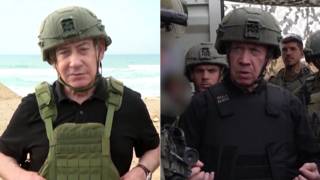

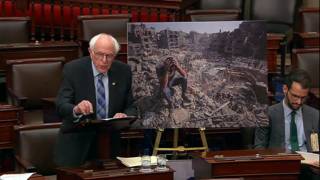
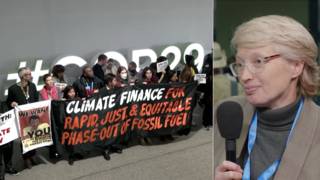




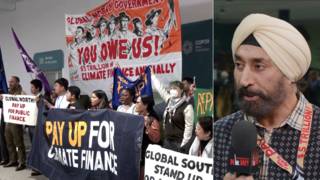
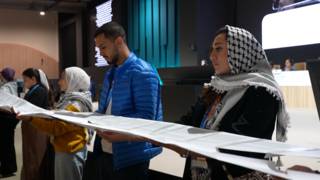
Media Options